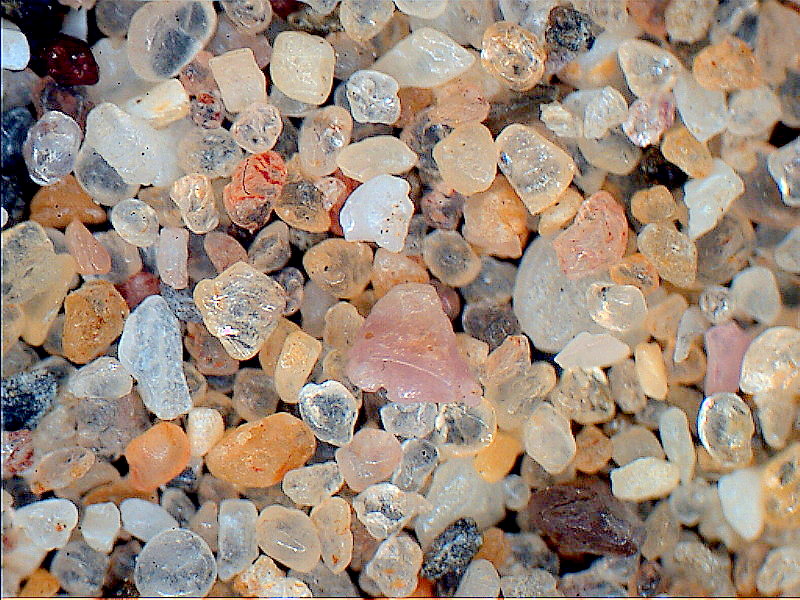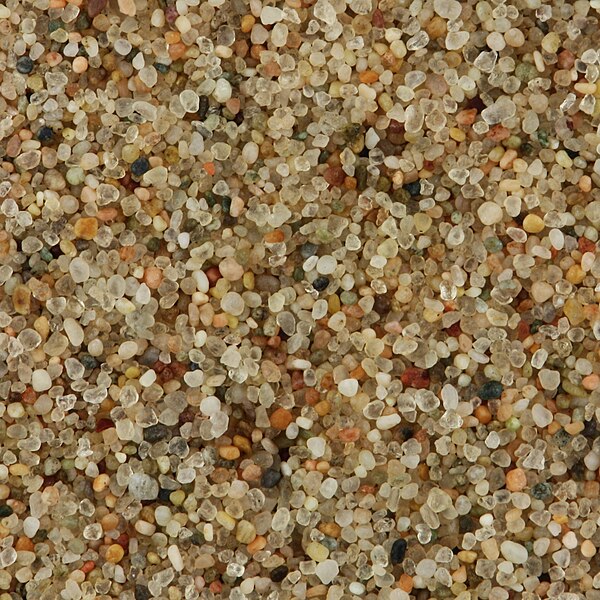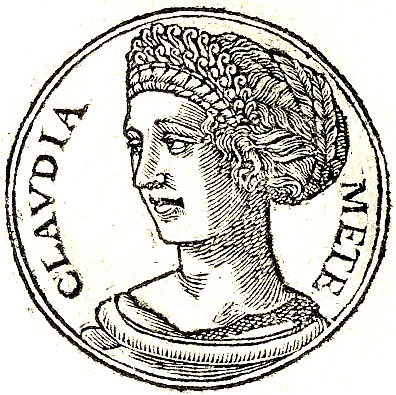.

Mosaic from Centocelle, love scene: Roman, 1st c. AD: photo by Alberto Fernandez Fernandez, January 2008 (Collection of Greek and Roman Antiquities, Kunsthistorisches Museum, Vienna)
Kisse me, sweet: the warie lover
Can your favours keepe, and cover,
When the common courting jay
All your bounties will betray.
Kisse again: no creature comes.
Kisse, and score up wealthy summes
On my lips, thus hardly sundred,
While you breath. First give a hundred,
Then a thousand, then another
Hundred, then unto the tother
Adde a thousand, and so more:
Till you equall with the store,
All the grasse that Rumney yields,
Or the sands in Chelsey fields,
Or the drops in silver Thames,
Or the starres, that gild his streames,
In the silent sommer-nights,
When youths ply their stolne delights.
That the curious may not know
How to tell' hem as they flow,
And the envious, when they find
What their number is, be pin'd.
Ben Jonson: To the Same [Celia], The Forrest, 6, in Workes (1616)
Clodia Metelli,
third daughter of the patrician Appius Claudius Pulcher and Caecilia
Metella Balearica; thought to be the original of the Lesbia of the poems
of Catullus: image from Promptuarii Iconum Insigniorum, 1553, published by Guillaume Rouille (1518?-1589)
Quaeris, quot mihi basiationes
tuae, Lesbia, sint satis superque.
quam magnus numerus Libyssae harenae
lasarpiciferis iacet Cyrenis
oraclum Iouis inter aestuosi
et Batti ueteris sacrum sepulcrum;
aut quam sidera multa, cum tacet nox,
furtiuos hominum uident amores:
tam te basia multa basiare
uesano satis et super Catullo est,
quae nec pernumerare curiosi
possint nec mala fascinare lingua.
tuae, Lesbia, sint satis superque.
quam magnus numerus Libyssae harenae
lasarpiciferis iacet Cyrenis
oraclum Iouis inter aestuosi
et Batti ueteris sacrum sepulcrum;
aut quam sidera multa, cum tacet nox,
furtiuos hominum uident amores:
tam te basia multa basiare
uesano satis et super Catullo est,
quae nec pernumerare curiosi
possint nec mala fascinare lingua.
Catullus: Carmina VII: Ad Lesbiam

Grains of sand, Yoff, Dakar, Senegal: photo by R G, 8 March 2009
You ask how many kissings of you, Lesbia, are enough for me and more than enough. As great as is the number of Libyan sand that lies on Silphium-bearing Cyrene, between the oracle of sultry Jove and the sacred tomb of old Battus; or as many as are the stars, when night is silent, that see the stolen loves of men, -- to kiss you with so many kisses, Lesbia, is enough and more than enough for your mad Catullus: kisses, which neither curious eyes shall count up nor an evil tongue bewitch.
Catullus: Carmina VII: English translation by F. W. Cornish in The Poems of Gaius Valerius Catullus, 1913

Rounded and fine-grained eolian sand sample from the Gobi Desert (near Dalanzadgad in Mongolia). The width of the view is 10 mm: photo by Siim Sepp, 24 October 2011

Mosaic from Villa Romana del Casale, near Piazza Amerina, Sicily: photo by M. Disdero, June 2006




8 comments:
The Centocelle love scene was perhaps the inspiration for Monty Python's "The Meaning of Life"
It's hilarious...
Conrad,
Jonson revitalized the classics, encountering Catullus, Martial and other Roman poets not as fossilized antiquities but as contemporaries, writers fully as cultivated and sophisticated as he had cause to think himself to be. Before him, many had wondered how the seemingly impossible feat of Anglicizing Catullus might be pulled off. He showed how it could be done, adapting and adopting a tone, a pacing, a wit and world view modulated to the original but bringing forth something new in the adaptation. Oscar Wilde's comment, "He made poets of Greece and Rome terribly modern" captures the sense of this. Jonson laboured to create "naturalized" versions, modern variants on classical genres. In doing so he invented, with characteristic boldness and confidence, a classic idiom for his own language, a classical temper, a style at once recognizably native and recognizably derivative.
Instead of simply providing a a poetic "trot", he reinvests the characters, scenes and atmospheres of the ancient poems with a contemporary life. He has translated one signifying world into another with apparent ease and without pedanticism or patronising. Here, "Rumney" refers to Romney Marsh, on the East coast of Kent, rich in grazing fields at the time. And "Chelsey fields" refers to the Thames riverside area, a precinct whose name was onomatopoetically derived from the tidal "chesel" (a word descended from OE "ceasel"=sand, pebbles), so that in the briliant conversion of reference we can hear the washing of sand grains on sand grains, along the bank of the Thames. In the lines following, Jonson originally wrote "in silver stremes/ or the starres, that guild the Thames", then revised that to return the silver where it properly belonged. The signs of close work are apparent.
Ben was a great poet, and a force in the shaping of the poetry of his language. Historical consciouness can rarely be found at work in poetry. In my view, it cannot be found much at all nowadays, because the past has been largely ignored and/or denied (as inconvenient). For this reason I think poets now could do worse than to attend to the example of Jonson. Those modest (or honest) enough not to think of themselves as poets might make an even better use of his work, that is as a source of enjoyment and delight.
Well said (as always)
The cadences and figurative flourishes, as you've indicated, are good models still for contemporary poetry (unless poets today continue their "trot" towards l=a=n=g=u=a=g=e oblivion and revert, as kids with their iPhones are doing, to an 'opposable thumbs'literacy)
I've grown cynical in the past few years: Jonsonian rhythms are no longer possible today.
Thanks for bringing on Catullus. He is PERMANENTLY terribly modern. (There is in fact something terrible in him.)
super alta vectus Attis celeri rate maria...
devolsit ili acuto sibi pondera silice...
Of course, some of it is lovely:
amabo, mea dulcis ipsitilla
meae deliciae, mei lepores...
But then there's always the bit at the end:
nam pransus iaceo...
well, enough.
Separately, I am intrigued by "modest (or honest)".
Chris,
I suppose it's that dangerous, sometimes wicked edge in Catullus that can at times make him feel so "modern". Upon your friendly instigation I spent a bit of time (in my mind, of course, the one place where it's safe to be pedestrian) on XXXI -- who could say no to Sirmio, after all -- but I'm afraid the proprietary ghost of the young Ezra Pound, basking there in arrogant immortality, sent me off, not a little chastened. Then I returned to LXX, which I've worked up before; I do very much like Sidney's version -- but a wiser head prevailed, here, as to the sentiments ("Men are even MORE faithless, I'd say!").
This presently posted version of VII has long been of interest because of the wit in it; and also because of Jonson's momentous arrival at the crossroads of history to pick it up, "rusticate" it, and drive it off in the back of his cart toward a different kind of world, one in which London no longer had to apologize to Athens or Rome. Equals conversing with equals, it would be, after that. But they had not been equal until he had made them so.
Clodia/Lesbia, by the by, appears to have been a formidable and difficult on again/off again friend, a fact to which some of the more sour moments in Catullus may be imaginatively attributed. I thought it was interesting that in the writing of the HBO series Rome, the decision was made to replace the actual character of Atia of the Julii (of whom, in fact, little is really known), with a simulacrum drawn upon the hard, clear lines of Clodia Metelli. Polly Walker plays this to the hilt.
Here for example, is her meeting with her rival for the affections of Antony:
Atia of the Julii (based on Clodia Metelli) whispers sweet nothings in the ear of Cleopatra
Conrad,
I dwell under no illusions as to the possibility of Jonson's achievement of an English classicism serving as example or model for these times. He was an autodidact and yet a person of broad and deep learning. It is impossible to extend a tradition of which one was never a part and of which one was indeed never aware. To build refined rhythmic or figurative techniques upon a nonexistent foundation, I mean, is something that can not happen -- nor for that matter is there anybody these days interested in trying. The lemming race toward oblivion to which you refer has already been won by the swiftest hustlers. The rest of the pack appears to be rushing on in unabated haste toward the edge of the cliff. A pity that, but then, any lament for the death of poetry must be drowned out by the greater lament for the death of the planet.
What I did and do think useful in Jonson's achievement is the discovery of heuristic imitation as metaphor, a transference not of image fields but of voices, sensibilities, codes, eras, mundi significantes. Through that process comes knowledge and self-knowledge. But not jobs, prizes, grants, tenure, publication, and the gaping admiration (and envy) of a million insipid academics who took a wrong turn on the way to the Derrida Cookout and wound up being the present epoch's simulacra of experts on and teachers of poetry. (The poetry, that is, of themselves and of their equally lame and tiresome cronies -- the architects of the New Canon, let's call them, to give credit where due.)
I carried these words and images around with me all day yesterday like charms. It was very, very satisfying. Curtis
Tom,
Such a light touch, the rhythms, the moving around of the comma, the numbering of all those called for kisses, as in
. . . .First give a hundred,
Then a thousand, then another
Hundred, then unto the tother
Adde a thousand, and so more:
Till you equall with the store,
All the grasse that Rumney yields,
Or the sands in Chelsey fields,
Or the drops in silver Thames,
Or the starres, that gild his streames,
In the silent sommer-nights. . .
5.24
light coming into sky above still black
ridge, song sparrow calling from branch
in foreground, wave sounding in channel
quantities to be determined
as function of, after
the line in the form, where,
following equation of
silver circle of sun rising above ridge,
line of 7 pelicans gliding toward point
Steve,
Yes, the quantification!
quantities to be determined
as function
line of 7 pelicans gliding toward point
following equation of
silver circle of sun rising...
though it's in the low 40s here this early a.m., big steely clouds rolling in from direction of El Cerrito, and we are told to expect: thunderstorms, high winds, local small hail... all before nightfall.
Post a Comment